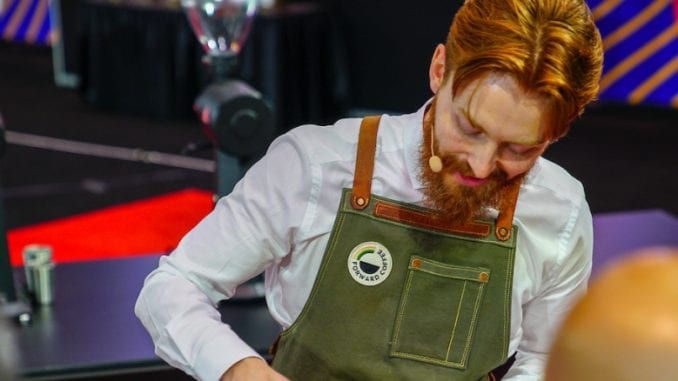
The Canadian barista champion, who placed third at the 2019 World Barista Championship in Boston, discusses building a routine based around constant improvement.
BY CHRIS RYAN
BARISTA MAGAZINE ONLINE
Photos by Lanny Huang for World Coffee Events
Last year, after seven years of competing in coffee competitions, Cole Torode broke through on the World Barista Championship (WBC) stage, earning fifth place at the 2018 WBC in Amsterdam. Cole returned for the 2019 barista competition season with the goal of improving on his fifth-place finish at the 2019 WBC in Boston, and that goal came to fruition. With a progress-themed routine that mirrored elements of his 2018 performance—including using some of the same coffee from Colombia’s La Palma y El Tucan—Cole was able to take third place at the 2019 World Barista Championship.
We talked to Cole, who is a partner in Calgary, Alberta-based Rosso Coffee Roasters, about crafting his 2019 routine, growing from his experiences, and much more.
Chris Ryan: How did you approach competition going into this season? Did making the finals last year influence your feelings as you planned your routine?
Cole Torode: This year my mindset was different as WBC approached. In Canada, we didn’t have any regional competitions this season, so just nationals and worlds, and my routine at nationals was very comparable to my routine at worlds. This was the biggest difference for me, as last year in three weeks between competitions, I had to start from scratch and build a brand-new routine. This year, I leveraged the provided feedback from the judges at nationals as well as last year’s worlds presentation, and used that to make improvements. I’m always open to feedback and finding room for improvement.
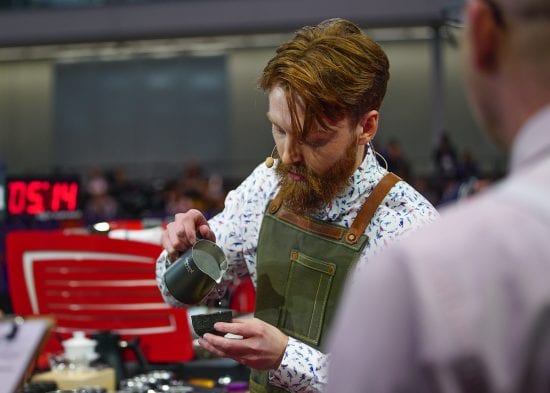
I know you used coffee from La Palma y El Tucan again, and the Sidra variety. Why did you decide to return to some of the same elements from last year’s routine, and how did you reinvent them for this year?
For me, why change a good thing? I have a great relationship and huge amount of respect for the team at La Palma y El Tucan (LPET). Their story is unique, their coffee is exceptional, and the people are grounded and down to earth—it was a real no-brainer to continue moving forward with them. We align on our vision and our values, and that’s really important for me.
In regards to keeping certain elements, I just didn’t want to change anything that I felt was a success from last year—such as the portafilter tray on the judges’ table—so instead I tried to refine those successes where I could. I used the same lot of Sidra (129) in both Amsterdam and Boston, and used the concept of “vintage” to showcase the coffee this year. I actually had a line that fully referenced Amsterdam, and for me that was a fun way of weaving together my WBC presentations. This also really reinforced my theme of progress.
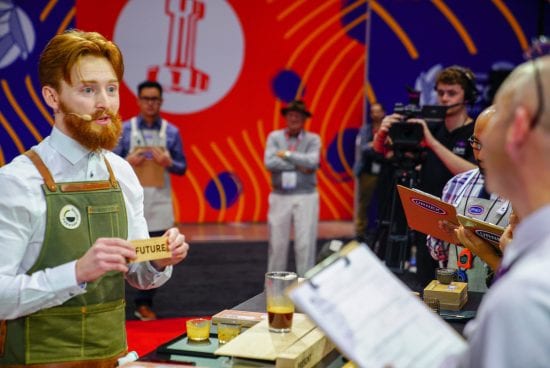
Where did the past-present-future concept come from for you?
This is a concept that was suggested by my brother and coach Dave probably two years ago, but at the time we weren’t suited with the coffee necessary to fulfill the concept. In November, we roasted all of lot 129 (my coffee from WBC Amsterdam) and froze it in vacuum-sealed bags. About a month or so later, Dave reminded me of the concept of past-present-future and the ball started rolling. We visited LPET and found two amazing Sidras (lot 255, my “present” coffee, and also lot 260, which we’ll serve at the café) that were very different from one another and both fit the criteria we were after.
What was your experience like at WBC this year? What did you enjoy about it and what did you learn from it?
My experience was amazing—and different from Amsterdam, absolutely. This year I felt more natural, more calm, and more confident, all with much thanks to the experiences from last year. The first round was a little rough. Without your own music, it’s easy to lose your pace, and I did that for sure. It looked like I was talking in fast-forward, and there were a few workflow movements I didn’t intend on making. The second round was much better; I changed a few elements that I believe were of benefit, such as my sequencing when grinding my coffee—using two EK43s rather than one. For finals, I was near flawless. I hit all my marks, all the movements, all my extractions, and couldn’t have been more thrilled with how everything played out.
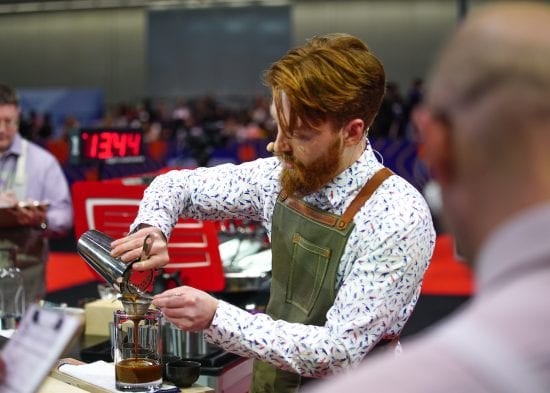
I had some really amazing feedback from peers at WBC on the concept of the routine. It was really uplifting commentary that honestly helped me achieve the placement I did. I wanted to take a moment and comment on the concept, because to me the message I was trying to send home was more defined as “progress.” One of our core values at Rosso is “constant improvement,” and it’s really been a driving factor for us through the years. When we look back, it’s platforms like barista competition that have pushed us, and having the mentality of “let’s make today better than yesterday” has really created progress for us.
I enjoyed every minute of WBC. It’s an emotional roller coaster and an all-consuming week once it all kicks off, but I really enjoyed being there, getting to spend time with a bunch of my coffee heroes, and just having real conversations about coffee—something we all mutually love. It doesn’t get much better than that.
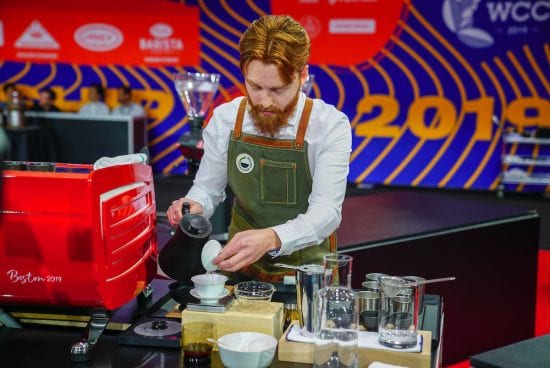
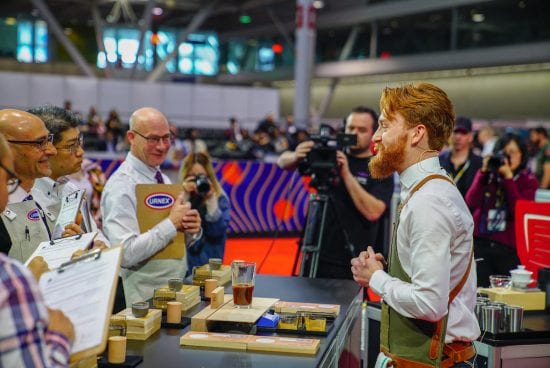
Ultimately, how did it feel to you to finish third? I assume there was some disappointment, but also a lot of pride. Is that accurate?
It’s accurate, for sure. I’m human, I’m competitive. At the end of the day, my pride far outshines a small glimmer of disappointment. My goal was to improve on my standing from last year, something I proudly accomplished with the same team behind me and the same coffee. I preached a message I’m passionate about and hopefully inspired a few up-and-coming coffee professionals around the globe. I couldn’t be more proud of my third-place finish and of our new champion Jooyeon Jeon.
Finally, a non-WBC question—can you tell us about your current role at Rosso. I know you do a travel journal for the company; can you describe why you keep that journal and how it benefits you, Rosso, and your customers?
My role at Rosso hasn’t changed much since last year. When I’m in Calgary, I’m doing quality control, training, and education, as well as our website and communications.
The journals started a year or two into our journey purchasing direct. We realized we wanted to have a platform that could share the stories of the coffees we serve, and thus began the journal. It’s actually interesting to read back on a few consecutive years from a trip and see how things have changed year over year. I’d really like to improve on this as the years go on. I’ve found it challenging summarizing thoughts and detailing a day after long and tiresome days, but it’s worth it. I have the privilege of sourcing our coffee menu and working with fantastic producers around the globe, and I’d like to share as much of that experience as possible. Resources like this help consumers better understand coffee, which I think is very important to coffee’s future.
We’ve been working on a project the last six months or so that’s going to give a new identity to the sourcing arm that I currently operate. Keep your eyes peeled for Forward Coffee—it’s just about to get moving.

